Chris Baty's Blog, page 234
July 12, 2012
We Want More Like Janna: Letters and Light ML in Saskatoon
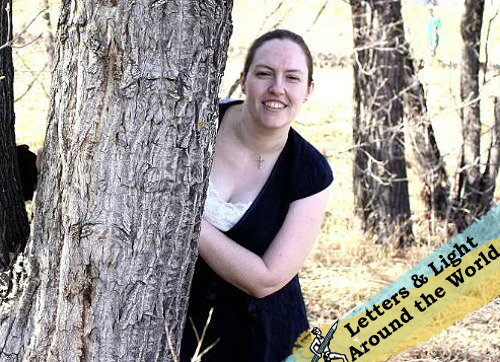
Janna Willard has participated in NaNoWriMo since 2001, and is a Reference Desk moderator and ML for Saskatoon, in Canada. When not wielding the moderator scepter or novelist’s pen, she blogs about living with ADHD, and hosts a blog for her guinea pigs’ musings, too. She took a break from all that story-telling to speak with us:
Can you talk about your experiences as a moderator and ML?
Moderating is always interesting. Reference Desk (where Wrimos conduct research and polls for their novels) has some of the most interesting threads, and it’s probably the busiest forum.
Last year, I started dating threads using Stardates in an attempt to make people laugh and to deal with the problem of time zones. The conversations are amazing. Last year, we had an incredibly respectful thread about gender identification. I was proud of all the participants in that thread.
ML-ing is interesting and lots of fun. My primary role is to run events. We are building a partnership with a local bookstore, where we held our first-ever Information Night and our Kickoff Party last year.
Last year we also had our first-ever writing workshop, run by the library’s writer-in-residence. I’m very hopeful that we’ll be able to repeat that this year, and possibly have some other events at the library, as well.
Has your experience with NaNoWriMo changed over the years? Do you consider yourself a master, now, of the art of 30-day noveling?
My first NaNo was in 2001, and I hand-wrote three pages (if that). What’s changed most is the people, largely because I moved in 2009. I’ve had three finishes, so I haven’t mastered the art of 30-day noveling, but I live in eternal hope that I’ll make it again this year!
My experience with NaNo has really changed through becoming more involved with the community, whether online or off. The community is so rich and vibrant, and full of amazing people. That includes my fellow ML’s, my local Wrimos, and all of the folks who poke their noses into Reference Desk.
Has your ADHD affected your NaNo writing, or vice versa?
ADHD affects basically everything I do. I don’t know who I’d be without it, because it’s been part of my life since I was a child. ADHD makes it difficult to focus, so it can be a struggle to buckle down and write. It‘s also hard to change focus once I get into something, so when I‘m really involved in writing, it can be difficult to stop and do something else (you know, like eat).
If I can hop onto my ADHD advocacy soap box for a moment: Executive dysfunction often looks like laziness or a lack of motivation, but as a general rule a person who has ADHD is really motivated to do stuff but can’t actually get started.
Sometimes that’s because we have trouble making plans, sometimes it’s because we can’t figure out how to break down the task into smaller pieces, but sometimes it’s because we just can’t make the focus happen. And that’s just how our brains are wired.
Medication can help, but it doesn’t always work. And it’s important to remember that pills don’t magically give us skills. We still need to learn how to make a plan and follow it. As I like to say, the only thing consistent about my ADHD is its inconsistency.
What’s been your favorite novel to write?
The one I wrote in 2009, Pointillism. It’s about a 17-year-old artist with ADHD. It’s part of the series I’m working on about teens with disabilities, and he’s one of my favourite characters. I threw all kinds of things at him, and his voice came through really strongly. It was the first time I’d written something so long from a male POV. That story was very different from anything I’d written before, and I loved the challenges.
Can you describe your guinea pigs’ blog?
I have three boars (males) whose personalities I try to bring out in their posts. Batman’s excitable and interested in everything; Bubble’s kind of a grouchy loner; Squeak’s stand-offish but becoming friendlier.
It started last year, when Batman participated in NaNoWriMo. I posted to the Marketing forum and asked people to contribute random writing during November. Batman “wrote” 4,000 words, which I’m hoping to publish by October. He’ll write again this year.
If you’re thinking about getting one (or two, which is better!), seriously consider seeking out a rescue or shelter and giving a forever home to a piggy who desperately needs one. I haven’t bought an animal from the pet store since I got my third guinea pig, way back when I was in grade six, and I have no regrets!
July 11, 2012
Cartoonist Len Peralta: 'We Need More Geeks'
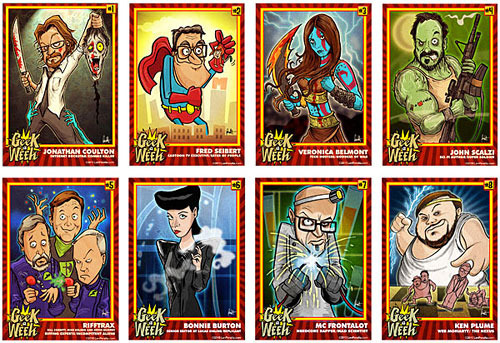
When we first encountered cartoonist Len Peralta, who designed the renowned Geek A Week trading cards, we knew he’d be the perfect designer for our collector’s edition of NaNoLand trading cards for three reasons: 1) He believes in many of the same things we do, such as ghosts, elves, and Bigfoot; 2) He wants to make art affordable for everyone; and 3) He designs with such a wacky, fun aesthetic it seems as if he’s a NaNoLand creature himself.
Len took a break from madly cartooning (and parenting a newborn baby) to chat about geekdom, trading cards, and his design approach.
What inspired you when designing these NaNoWriMo cards?
Well, my other project, Geek A Week, was my way of getting to work on more of the geeky things that interested me. A geek is a person who is passionate about something. You can be a geek about anything—Star Wars, knitting, coin collecting, writing! To me: Geek = Passion. That is why we need more geeks, because passionate people are fundamentally the most fascinating people around.
I’m also of the opinion that you simply can’t wait for things to come along and happen for you. You must create your own opportunities. That’s why NaNoWriMo and I fit together so well. It’s about motivating people to get out there and do something with passion. And I can totally appreciate that idea.
I knew these NaNoWriMo cards would really showcase my art, so I wanted to make them as bright and colorful as possible. I’m currently working on a graphic novel (with Rifftrax/MST member Bill Corbett) so being in that mindset really informed my style for these cards. Hopefully that comes through in the art.
Did you collect trading cards growing up?
Oh sure. I started early with the Wacky Packages from the 70s. They were these beautifully illustrated and funny trading cards that parodied different advertising brands. I eventually worked in advertising, so maybe they had an influence on me.
As I got a little older, I collected Star Wars and Empire Strikes Back cards. I was addicted to those cards. In many ways, Geek A Week is a fusion of those two influences: Wacky Packages and Star Wars cards. I referenced the look of them when I was coming up with the design for Geek A Week.
I also have a collection of Topps Hockey Cards (Teemu Selanne rookie card, FTW!). I also have a full collection of The Simpsons trading cards. I have more cards than I care to admit, actually.
How did you learn to draw cartoons?
I am primarily self-taught. I’ve been drawing ever since I can remember, and I just kept doing it. When I started my own business 10 years ago, I added illustration to my repertoire, and I found I was getting a lot more illustration jobs than copywriting and straight design jobs. That’s when my art really started ramping up. Now illustration and cartooning is my primary source of work, and I draw pretty much everyday.
Who are your design influences?
I’m a huge Tim Burton fan. I love his loose, cartoony style and his visual sense. I love Jim Lee and Stuart Immonen’s work. R. Crumb is a huge influence on my style as well.
But I also love pop art work from Keith Haring, maybe because I enjoy the simplicity of his style. I try not to overcomplicate things when I draw. I think working in advertising as a copywriter, oddly enough, helped hone my telegraphic style. I know most people don’t spend a ton of time looking at art. It has to grab them immediately. And I think that’s what I try to do with my work.
Have you ever done NaNoWriMo?
I haven’t. More because of my schedule than anything else. But I’d love to challenge myself with it one day.
If you ever do NaNoWriMo, will you type your novel in your own zombie font?
Wouldn’t that make it super hard to read? People would have a hard time enjoying my weird writing and plotting style. No reason to make it any more difficult for them to get through!
To collect the NaNoLand trading cards Peralta designed, donate $50 or more to NaNoWriMo’s summer fundraising drive by July 24.
July 10, 2012
The NaNoWriMo 2012 Summer Fundraising Drive: We Want More of You
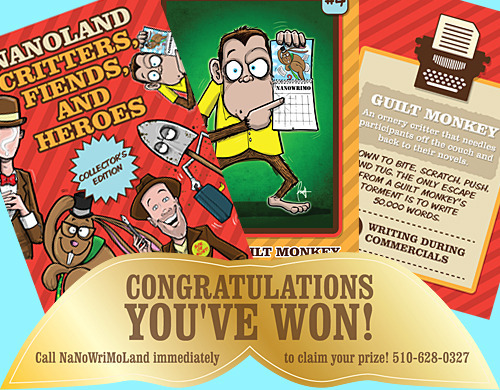
One of the perks of my job here at the Office of Letters and Light is that I get to read the thousands of emails that come into our inbox: the heroes’ journeys of people who’ve written a novel for the first time, the legendary exploits of those who’ve written a novel for the fourteenth time. Stories of people who met their husband or wife at a write-in, who wrote with our community while sitting in a hospital bed, or crowed about the persevering creativity NaNoWriMo taught them in a college essay.
Even when the days feel long, and the work seems overwhelming, I hear from one of you, spinning the story of how NaNoWriMo changed your life. Now? It’s our turn to celebrate you. Take a look at what we’ve got up our sleeve:
Over the next couple of weeks, as we launch our 2012 Summer Fundraising Drive, we’ll be publishing a series on the blog titled “We Want More of You”. We’ll be spotlighting incredible participants, your indomitable MLs, ingenuity-packed classrooms, libraries, and the countless other people writing novels with us who make NaNoWriMo the Helicarrier of creative writing that it is. We’re celebrating you, and raising the money we need to write with you for years and years to come.
Over the past thirteen years, you’ve come up with some pretty awesome lore. The Traveling Shovel of Death that conveniently comes around and kills of boring characters, the Guilt Monkeys that point accusingly when you’re behind on your word count, the tall tales about Chris Baty, a very tall man already. We’ve created five distinct limited edition trading cards, highlighting these mythic icons you’ve brought to life. Every supporter who donates $50 during our July fundraising drive, will receive a pack of three of those cards.
Natasha Romanoff? Meet your match in the mysterious and elusive Mr. Ian Woon.
Bruce Banner? Sure, you get big, but Plot Bunnies tend to proliferate exponentially and overwhelmingly when one isn’t looking.
I’m not done with the pop culture references yet! Three of the 1,000 card packs we’re sending out will have a Golden Mustache inside, which entitles each winner to claim one of our three grand prizes:
A stylish vintage typewriter donated by California Typewriter.

A fantasy writing package donated by Castle in the Air that includes Venetian glass pens, Roman leather journals, hand formulated ink, sealing wax cooked in cauldrons, handmade writing paper, and more.
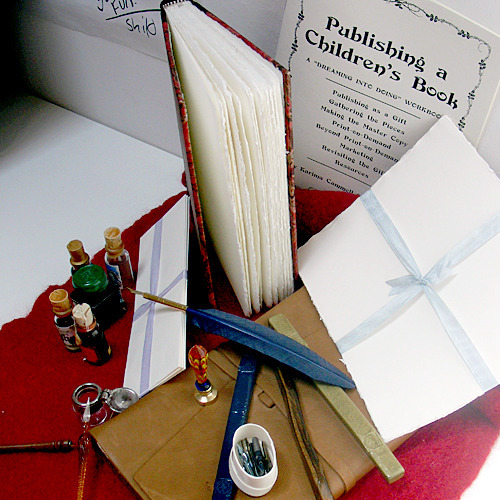
A cuddly version of each character in the trading cards. (Except in the case of the Traveling Shovel of Death, of course. You get the shovel, but cuddly it is not).
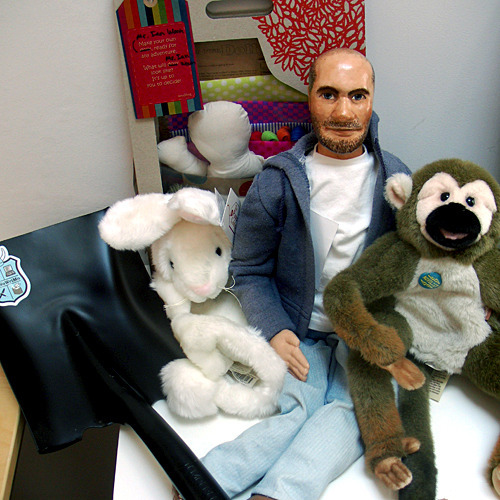
Charlie has Willy Wonka, Nick Fury has the Avengers. Us? We have you.
The worlds of imagination you create en masse every November, the blood, sweat, and tears you pour into your living, breathing protagonists: we’ll bet on you any day. In 2012, we want more of you; and we need your help, and creative and financial support to support the growing community we’re all a part of.
Lighting up the Bat-signal, putting my wand up in the air, spinning like the Girl on Fire, convening the Council of Elrond, writing in to the author of An Imperial Affliction, and thinking of many more cultural references to highlight your heroics, and how very, very glad we are to write with you,
— Tim
July 9, 2012
Lessons From the LARP Side, Part 2: Setting
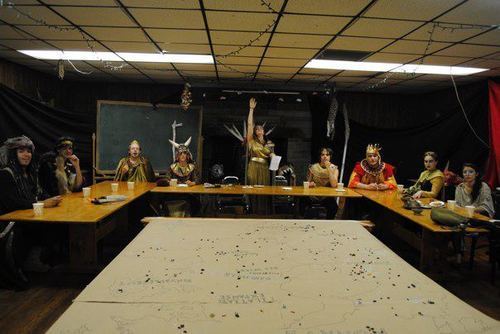
Hello there, adventurers! Welcome back to our series about what I’ve learned as a novelist from writing adventure games for Live Action Roleplays. Last week, I gave you an overview of what the gamewriting process looks like. This week we’re going to take a closer look at the process of creating worlds for other people to play in.
Every story, whether novel or game, has a setting. Maybe that setting is a whole new world, with strange beings and stranger magics, or maybe it’s a complex network of planets in the distant future. Maybe it’s an apartment complex in Chicago! No matter what kind of story you’re telling, it has to be set somewhere.
World-building for an adventure game is very similar to world-building for a novel. The biggest challenge is that of perspective. For an adventure game, you’re going to have other people playing in your world, so you have to figure out what they need to know, and then how to convey it. So what, then, do they need to know?
They need to know everything. Surprise!
Your players are going to be acting as characters who live in this created world full-time. They need to have an understanding of how the world works. They need to know the geography, the politics, the social dynamics, the hierarchies, the major figures, the culture, and so on.
Going through this a couple of times, you learn quickly that people aren’t good at processing vast information dumps like that. As such, it’s important to figure out what matters most and concentrate on that. You can come up with all those details in your head, and you can mention them during world background, but they’re not what you need to focus on.
Does the game’s plot revolve around a succession crisis? Then give an in-depth explanation of how the monarchy works. Is it set at a boarding school? Focus on the social dynamics of the upper- and lower-classmen. Each story has different things that matter most about its setting. If you can find these defining characteristics and emphasize them, you’ll get a much stronger and more coherent setting.
Another interesting issue is that of misinformation and lack of information. World background can become an interesting exercise in releasing information calculatedly, which is a fancy way of saying “lying to your players”. I ran a game where I told my fantasy society all about their gods and how much they worshipped these mythical beings, which resulted in a lot of surprise when the gods showed up in-game and turned out to be conquering aliens from another dimension.
You can also use diverse world backgrounds to play with expectations. I recently co-ran a game that involved two cultures locked in a Cold War-like conflict with each other. We separated the players into two separate groups, and then gave them each different, propaganda-fueled information about the opposing side. Each side thought the other was a horrifying wasteland, and that they themselves were clearly the heroic protagonists of the game. When during the game the two armies were forced to work together against a much larger threat, the ensuing culture clash and misconceptions drove a lot of fascinating interactions.
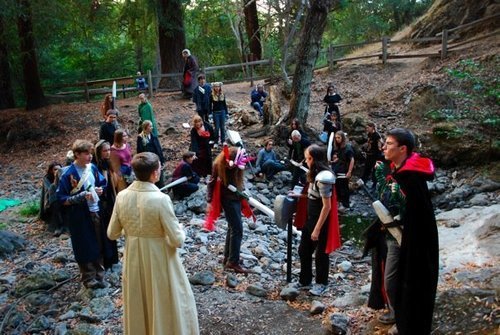
So what lessons can we apply to world-building for a novel? Well… nearly all of it!
1. Figure out the core of your setting.
What elements of the setting matter to the story? What are the central conceits that matter most to the characters and define the story? Figure out those characteristics, and focus on them. Make them shine, and make sure you understand them in detail.
2. Q&A time!
Get a friend (or better, a couple of friends) to come over, and then explain to them everything about your setting. Then have them ask you questions about it. See what comes up! You might be surprised at how much new material you wind up with… and how many holes you have to patch.
3. What do your characters know?
Figure out not just how the setting actually works but how your characters think it works. Their perspective on your world can define their worldview, and, characters with vastly different perspectives, or operating with false information, can lead to some neat developments.
It’s also an important thing to keep track of in a story—unlike in a game, the person controlling the character knows more than they do, so you have to make sure a character isn’t spouting knowledge they shouldn’t know.
Have fun world-building, everyone! Next time we’ll talk about writing characters and their dynamics.
— Ben
July 6, 2012
The OLL-iverse: Starlog 5
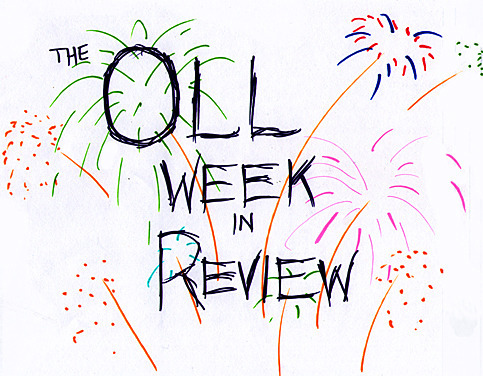
Hello, everyone, and welcome to July! Did you know that July is a silly month? True fact. One time I was hanging out with July at its house, and it had the thermostat up way too high. I asked it why and it told me it was so that we could have an excuse to throw ice cream at each other. I pointed out that ice cream, while delicious, is sticky and kind of gross when melted. July responded by throwing a full tub of vanilla ice cream in my face.
These days I prefer to hang out with cooler months, like August or November. Whatever, July. I suppose I should still let you know what happened this first week. This recap is brought to you by Ben, who isn’t so fond of vanilla either.
Camp NaNoWriMo:
June is over! June is done! June has gone! Did you win? Lindsey set off some fireworks in your honor, and ran down some awesome Camp stats in your NaNoMail inbox!
Camp NaNo’s gremlins decided to pull one last prank on all our winning campers over the weekend, and disappeared the winning page. Thankfully, our tech counselors, Dan and Jezra, were on the job. Here’s how to get back to the page of guts and glory.
Write-a-thon:
We’re having an early bird special on RSVPs for our annual Night of Writing Dangerously: $50 off if you manage to hit your fundraising goal during July!
There’s a mysterious teaser for this summer’s super incredible donor goodies over on our Facebook page… My favorite guess: the monkey butler. If we sent all those out, how would we get anything done in the office menagerie?
Young Writers Program
Students under the age of 18! Want to immerse yourself in the camping experience as you get amped for August? Check out the Cabin forums over on YWP, and bring your pets—hippogriffs, squid, and beagles welcome.
Elsewhere:
A Stanford professor put out the theory that reading novels is like taking your brain to the gym. I posit that writing novels is like taking your brain to the Olympics! The gauntlet has been thrown down.
One of our favorite webcomics, Strong Female Protagonist , has just launched its second issue! It follows the adventures of a young American with super powers and a crippling sense of social injustice. Give it a read!
It was the Fourth of July! I had a totally sweet Space Fire Monster Explosions Cookout Independence Party.
This weekend, July continues! Fortunately, the month seems to have forgotten about me now. I plan to keep a low profile to avoid any airborne dairy products. Hopefully I can last until August!
— Ben
July 5, 2012
A Real Life Book Swap, Inspired by Twitter
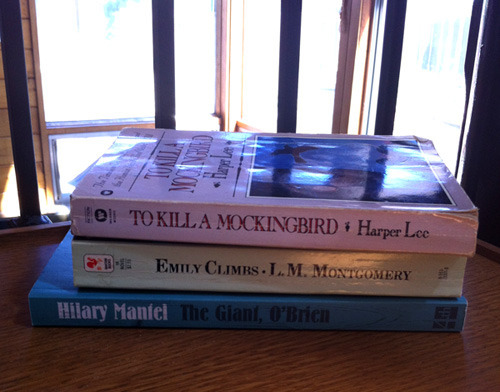
For whatever reason, Edmonton has had an incredibly lively and interactive Twitter community for years, and on any given day you’ll see a ton of activity on the hashtag for the city, #yeg (which is also our airport code), and the various sub-hashtags that #yeg spawned. (#yegfood talks about restaurants and farmers markets and such, #yegwx is for Edmonton weather—you name it, we’ve probably got a yeg hashtag for it.)
As a result, there’s a vibrant real-world component to Twitter here that I’m not sure exists on the same scale elsewhere. I’ve gone to all sorts of events that have been organized on Twitter, but earlier this week, I went to what might have been the coolest one.
The hashtag was #yegbookswap, and it involved people picking out three books: one they loved as a child, one they loved as a young adult, and one they loved as an adult. We all found copies of our three picks (used books encouraged), and brought them to the get-together. Everyone would then go home with three new books that someone else loved at some point in their lives.
It was really, really awesome. A bunch of my friends came with me, and I met a ton of other bookishly inclined folks in Edmonton. We were there for close to four hours, and it was just people talking about books, being excited about reading, and generally being super fun. Everyone wrote a little card to put in their book explaining why they picked it, and we had some group conversations about what we did (and didn’t!) bring, and why. Then we hung out and mingled for hours, talking almost entirely about books.
Part of the reason NaNoWriMo has been so successful is the community it has created around something that’s usually a solitary pursuit, and this had a very similar vibe to it. Reading is usually a solo adventure, and it’s immensely satisfying to get together with other like-minded folks and just talk about the thing you love.
Things like this are one of the many reasons I love Twitter. You hear people lamenting that social media is making us less social in person, but in my world that couldn’t be further from the truth. I’ve tried things, eaten food, gone places, and met people I never would have without Twitter and other social media. For me, the internet isn’t replacing the real world, it’s enhancing it.
What have your experiences with mixing the internet and the real world been like? And what would your three books—books you loved as a child, young adult, and adult—be? Mine were Ramona Quimby, Age 8; Jacob Have I Loved; and The Night Circus.
(The three books I came home with are pictured here—I’ve read To Kill a Mockingbird, but not in nearly 20 years, so I thought I should reread it.)
— Sarah
July 3, 2012
"I Sold my Camp NaNo Novel!" A Q&A with Nora Zelevansky
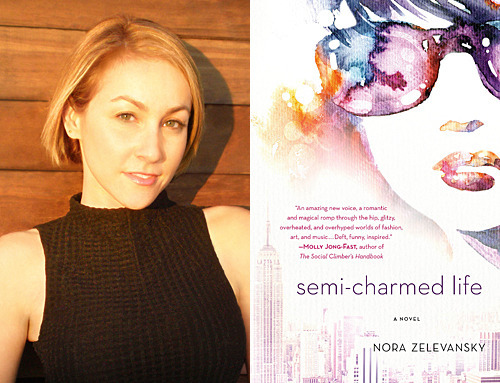
Nora Zelevansky is a multi-talented writer: she blogs about all things beautiful and cultural for the Huffington Post, she does weekly recaps of The Bachelor on her own blog, and now she’s a Young Adult novelist! Her NaNoWriMo novel, Semi-Charmed Life, is out now from St. Martin’s Griffin press. She took a break from Bachelor-blogging to answer a few quick questions for us and share some writing advice.
Can you tell us a little about Semi-Charmed Life and where the concept for the novel came from?
Of course! Semi-Charmed Life is a comedic social satire with a quirky tone about a college senior named Beatrice Bernstein, who has grown up in the midst of the art world on Manhattan’s Upper West Side (Her family is a holdout from the old lefty intellectual types that used to characterize that neighborhood 20 and 30 years ago). While her family has esoteric high-art tastes, she craves a more mainstream existence, but can’t seem to find her way there. In many ways, she is caught between two worlds.
She arrives at her off-campus apartment for senior year and quickly, through a series of mishaps, gets sucked into becoming a ghost blogger for this mysterious, famous-for-nothing socialite named Veruca Pfeffernoose. During that experience, her identity gets even more confused and her trajectory is changed forever. There’s a love story, too, and some magic realism! I dreamed about Veruca Pfeffernoose and her wildly opulent apartment while I was on vacation in the Caribbean with my husband actually. When I woke up, I wrote down the details of the dream, which flowed well. Then, months later, when I needed to pick a topic for my NaNoWriMo project, I pulled it back out. I’m so glad I remembered that it existed because I do tend to write down ideas and then never look at them again! (It’s, I think, the writer’s curse.)
Do you tend to plot your writing in advance or do you prefer to fly by the seat of your pants?
I’m not someone who invites a lot of structure into my life in general, for better or worse. I’m disciplined, but not structured, if that makes any sense. So, in my journalism work (my day job), I don’t tend to outline or plan too much in advance. This is my first novel, so in terms of fiction, I can only speak to this experience. But, because I was doing NaNoWriMo, I was encouraged not to outline and that worked for me! Realistically, I probably wouldn’t have either way. Too much outlining just takes the excitement out of the experience of writing for me.
Your background is in journalism—did writing from your imagination instead of the real world feel different?
Yes! And I was worried about it before I began and actually specifically chose to write in the third person instead of the first, so I wouldn’t feel like I was writing memoir (my creative writing has historically been largely personal essay). I do love to describe what I actually observe, but it’s a very different thing to write within a magazine’s constraints, for example.
Once I started the novel, writing fiction was like heaven to me. It was so freeing! Especially with this first book, which I was writing for myself without real expectations or pressure, I felt like I could create whatever I wanted and that felt like a huge amazing indulgence to me. I loved it!
I feel like letting your imagination do its thing is sort of what NaNo is all about and that’s why it’s a great process for writers, but also simply as an outlet in life. I was just happy doing it.
What, if any, revision regimens do you swear by?
As a journalist, I am used to revising and condensing until a story feels tight, without a lot of wasted words, so I was more than ready to revise when that time came. I’m not sure all writers feel that way. In fact, I think they probably don’t. But, for me, although editing can get exhausting, I see stories of all kinds as puzzles—and when I get it right, I can feel it click and that’s such a great feeling. In other words, I actually like editing a lot of the time.
In terms of regimens, I don’t think I have anything specific. I just read the material over and over again until I feel like I’m losing perspective and then leave it for the day.
I’m also a huge believer in getting lots of notes from different kinds of people with varied perspectives (people who know you, people who don’t, men, women, friends from different backgrounds and places, etc). Inevitably, some themes emerge and then you know what problems you really need to solve. Some criticisms are just opinion. Others point to actual issues.
How did you find out about NaNoWriMo, and what convinced you to participate?
You know, now I can’t remember how I first heard about it, oddly. I know I wanted to write a novel and I may have been looking for novel-related classes to take. I actually did end up enrolling in one at UCLA, but it wasn’t ultimately very helpful because I didn’t connect with the teacher. Also, you really don’t need a class to do NaNoWriMo.
Either way, the whole system made perfect sense for me from the very beginning. In the past, I’d often had ideas for novels about which I’d get excited and then later I’d decide that they weren’t good enough. I think that’s probably a relatively common obstacle. Writing an entire novel seemed intimidating and the NaNoWriMo process made it approachable—a day-by-day activity that didn’t require a plan. (And, as I mentioned, I was discouraged from outlining, which I loved because I was off the hook!)
Do you have any advice on writing or revision for NaNoWriMo participants?
My only advice would be to do it. It was just such a rewarding experience for me. Writing everyday was like getting yourself to go to the gym. It felt like a success in itself.
If I had to come up with a piece of advice, I guess I would say that I think it helped me to pick a topic to which I wasn’t married. I didn’t feel precious about the idea; it wasn’t something I’d been contemplating for years or anything like that. It allowed me to be really free with the story and I think that’s the greatest benefit to NaNo. It seemed like it made sense to choose something less stressful like that for the first time around, and to have fun with it!
Lastly, and most importantly, how likely would Veruca Pfeffernoose be to win a season of The Bachelor? What about Beatrice?
Ha! I guess you read my blog and know my dirty little secret obsession with The Bachelor. I love this question.
Well, Beatrice would be disowned by her family if she ever went on the show. But, if she went on it anyway and the bachelor that season was the usual meathead type (as opposed to her match in humor and intelligence), I think she would either be voted off right away because she couldn’t bear to compete with the pageant-girl types, or she’d make it to the top three or four, and then get voted off because she was too much of a spazz—you know, kind of like a friend vibe.
Veruca would win every time. No doubt about it!
July 2, 2012
What a Difference a Weekend Makes

A few weekends ago, my fiancé commented on two people lying in the grass—no blanket or picnic—just enjoying the sun in a park. “We aren’t really grass-lying kind of people are we?”
“Nope.” I replied. “Too much to do!”
I think about weekends a lot, not just because I get very excited about them, but also because I’m a little too interested in the ways that other people spend their time off.
Half the world works weekends while everyone else (myself included) is gallivanting about, free as a freakin’ lark. And it wasn’t so long ago that I was one of those weekend workers, dreaming of the moment I got to kick off my shoes after a long Sunday of pouring coffee for (and hopefully not on) my customers.
I worked as a waitress through grad school, and as such, I often worked the hardest on the weekends. My grad school assignments felt comparably easy to schlepping five plates of hot breakfast on my arm at 7:30 AM. I still have dreams that I’ve gone back to waiting tables on the weekends; that experience serves as a good reminder that not everyone gets these days to do with as they please.
While I am lucky enough to enjoy the blessed reprieve of the Saturday/Sunday combo (two days in a row back to back when I get to do whatever I want?!?), I try to be mindful of the way I spend it.
It’s easy to go to one extreme or the other: all chores all the time, in a mad effort to catch up on all the personal and domestic items you’ve neglected during the week; or to have too much fun and wake up Monday morning hating yourself for not having the good sense to do some laundry and get a good night’s rest.
The thing I am most fascinated by, though, are weekend traditions.
When I was growing up, my dad always made pancakes on Saturday morning, and I always had to do my chores before I was allowed to do anything else. But as an adult I crave a tradition to call my own!
I know someone whose Sunday morning always includes watching a DVR recording of the latest Saturday Night Live episode (I love this!). My neighbor invariably spends his whole Saturday biking with his partner in a new place or on a new path. They leave in the morning and don’t return until dusk. I have a friend who goes to the same Farmer’s Market every Sunday to eat the same fish tacos. (Incidentally, she is very good at lying in the grass.)
How do you like to spend your days off? Do you even get days off? Do you have a weekend tradition?
— Lindsey
Photo by Flickr user smittenkittenoriginals
June 29, 2012
The OLL-iverse: Starlog 4
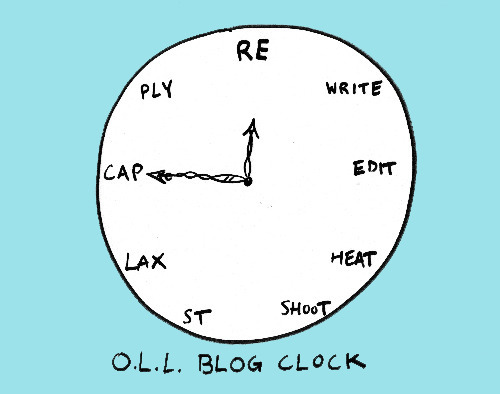
Hello, everyone! Do you know what time it is? Correct, it is weekly recap o’clock! My favorite time of day. My favorite time of week, really. That’s right, out of the whole week, this is my favorite time. I get to look back and remember everything that happened! How great is that? So great. Seriously. It’s even better than rest o’clock (though relax-thirty is a close second).
Today’s post is brought to you by Ben, who has a very fine hat. He’ll tell you all about it next week.
Camp NaNo:
The end of June looms large! Everyone is getting close to the end, one way or the other. Don’t forget to validate!
Lindsey has some great thoughts and encouraging words to push you over the top and finish your novel!
Script Frenzy:
We announced that we are bringing Script Frenzy to a close, after years of wonderful script-writing adventures.
Over on the forums, Screnzies are sharing their thoughts and memories of Script Frenzies past.
On Facebook:
This week’s Facebook writing prompt is to give Chris Angotti a wonderful fairytale ending with his bride-to-be, Allison on the eve of his wedding day. Give him some (fictional) love!
Fun stuff around the net
Some good thinky-thoughts in the office over the Atlantic’s series The Myth of Work-Life Balance.
Who doesn’t have some fondness for When Harry Met Sally, or Julie and Julia? Lena Dunham writes a lovely tribute to Nora Ephron.
Arrowed! Wired’s GeekDad blog critiqued the archery in the Hunger Games, Brave, and the Avengers. These articles are a little older, but we’re saving ‘em up for Tavia’s son, Archer, in case he decides to take his name super seriously.
Have a good weekend, everyone! What have you been reading on the internetz this week? Are you all getting ready for the Fourth of July? Any exciting plans? I myself will be busy making my annual pilgrimage to make sure that Will Smith and Jeff Goldblum are prepared to defend us from any extraterrestrial threats.
June 28, 2012
Lessons From the LARP Side, Part 1: Gamewriting
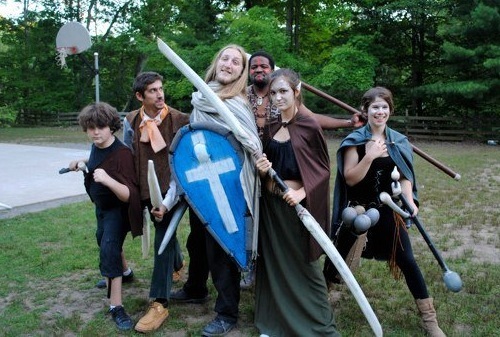
Yes, it is true. I am that dorkiest of dorks. I am a LARPer, and I am proud. More over, I am a LARP-writer. I’ve dedicated more time to writing LARPs than any other form of fiction (even novels), and you know what? I’ve learned an awful lot from the process. Over a few posts, I’d like to take you inside the weird and wacky world of LARPing and share some of the lessons I’ve learned from it!
Hold on, let’s rewind for a second. What the devil is a LARP? Well, LARP stands for Live-Action Role Play. We’re the folk in the woods with costumes and foam swords, or in the parlor with weird outfits and eccentric modes of speech.
I write for The Wayfinder Experience, a summer camp for teens in upstate New York, and Westfinder, a small group in Berkeley, California. Both are based more on improv theater, so we tend to emphasize storytelling and character. It’s lots of fun! Curious about how all that might work from a writing perspective? Read on!
Well, what goes on in one of our games? Unlike some other groups, most of our games are standalone. Every time you show up to play, there’s a new world, with new concepts, new characters, new everything! We play anything from dark sci-fi to epic fantasy, twisted cyberpunk to comedic murder mysteries. A gamewriter (that’s me!) puts together the setting, writes brief descriptions of the characters everyone is going to play, and orchestrates the overarching plot (called the Flow).
The players spend a day or two learning about the world, fleshing out their characters, and building relationships with other characters. They get costumed and equipped, then the game starts!
The gamewriter generally pre-arranges some major catalyst moments (the King gets assassinated! the Dark Lord returns! the magic sword breaks!) that the relevant people know to execute, but for the most part the plot is player-driven. It’s all improvised, and things rarely go entirely according to the gamewriter’s original plan.
Writing a game is a very different process from writing a novel, or script, or anything else. There are a lot of commonalities, of course. You have to create a world, characters, a basic plotline… We often joke in NaNoLand about how our characters get away from us, and have ideas of their own about the plot, but here they really do!
So what have I learned that applies back to novel-writing? Here are a few big lessons:
1. Deadlines are the best.
NaNoWriMo is wonderful for this and with gamewriting, there’s the added pressure of knowing that there are dozens of people waiting to play your adventure who need their character sheets! Nowadays, if I have writing I really need to get done, I give myself a deadline by which I need to hand the writing to someone else. Preferably, someone who’s about to go on a trip or otherwise out of touch, so I can’t give myself extensions. It really helps!
2. Don’t be afraid to steal from yourself!
When I was younger, I thought that once I had used an idea in a story, that was it for that idea. Not allowed to use it again. Nope. Even if no one ever saw the story, and it just languished on my hard drive forever.
Well, that’s ridiculous! I had some good ideas back then, and they’re not doing anyone any good sitting in the dark. There’s nothing wrong with reusing concepts from older characters. Just give them a fresh spin, and they’re good to go, sent to a new player who will give them a totally new interpretation.
The same is true for stories! Of course, if you’re actually publishing your works, you might not want to engage in blatant self-plagiarism, but… try looking through your early, stowed-away works some time. A lot will be junk, but there might be some good meat to cannibalize.
3. Write the story only you can write.
I know, you’ve probably heard this before, but it’s really true. Wayfinder and Westfinder have tons of would-be gamewriters, and there’s lots of competition to get a game run. Everyone has their own idiosyncratic style, the things they love, and so on. Find the story that’s uniquely yours, and it’ll shine above the rest.
Tune in next week, when we’ll be talking about worldbuilding!
— Ben
Chris Baty's Blog
- Chris Baty's profile
- 63 followers



